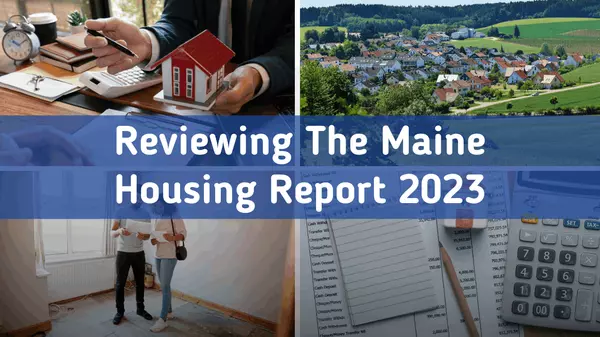Housing Supply and Affordability with Harrison Smith and Ryan Fecteau
In this article, we will delve into the important topic of housing supply and affordability, specifically focusing on the housing market in Maine. We will explore the factors contributing to the need for more housing, the challenges faced in meeting this demand, and the initiatives being undertaken to address the issue. Our discussion will be based on a conversation with Ryan Fecteau, who is actively involved in housing policy and serves as the Director of the Governor's Office of Policy Innovation and the Future (GOPIF) in Maine.
The Need for More Housing
Fecteau highlights two key factors driving the need for more housing in Maine. Firstly, there has been a decrease in household size, with fewer people living together. This decrease in household size has a significant impact when spread across the population, resulting in a higher demand for housing. Secondly, there is a growing issue with old housing stock coming offline, coupled with insufficient new housing construction to keep up with demand. These factors contribute to the need for increased housing production to meet the needs of the population.
Fecteau provides an interesting example to illustrate the impact of smaller household sizes on housing demand. He explains that if there are 100 households in a community and each household has half a person living separately, that adds up to 50 people. If these individuals live in pairs, it would require 25 additional homes to accommodate them. This seemingly small change in household size can result in a significant demand for housing.
Furthermore, Fecteau emphasizes that the population is not declining, but rather individuals are living in different locations. This means that the demand for housing remains high, even if it may not be immediately apparent. He stresses the importance of recognizing this demand and ensuring that housing production keeps pace with the changing needs of the population.
The Housing Shortage in Maine
To quantify the housing shortage in Maine, Fecteau refers to a report released by NBT Bank, which estimates a shortage of 15,000 housing units in the state. However, he notes that the state is currently undergoing a comprehensive study of housing needs, which is expected to provide more accurate data on the extent of the shortage. The study, conducted by HR&A Advisors, is anticipated to be published in the early fall.
Fecteau also mentions the work of Up for Growth, a national organization that has identified Maine as needing 20,000 units of housing based on their national underproduction study. These figures highlight the urgent need for increased housing production in the state.
Climate Migration and Housing
In addition to the factors mentioned above, Fecteau emphasizes the importance of considering climate migration in the housing conversation. He explains that people may be moving from high-risk areas, such as California and Florida, to states like Maine that are perceived as having lower climate risks. This potential influx of climate migrants adds another layer of complexity to the housing issue.
Fecteau refers to a map released by a company a few months ago that shows the highest-risk counties across the country. Interestingly, none of the high-risk counties are in Maine or New England. This raises the question of what the future might look like in terms of climate migration and the potential movement of people from coastal areas to the interior parts of the state.
Initiatives to Address Housing Challenges
Fecteau discusses several programs that are currently being implemented to address housing challenges in Maine. One significant program is the state's version of the low-income housing tax credit (LIHTC), which was created in 2019. This program allows the state to leverage federal dollars that are not available without a state credit. The initial investment in this program was $80 million over eight years, and since then, additional funds have been allocated, including $50 million last year and $35 million in the current state budget.
Another program is the rural rental housing program, which focuses on creating smaller-scale multifamily housing with five to 18-unit structures. This program has been successful, with the initial $20 million investment fully utilized and an additional $35 million allocated in the current state budget.
Overall, the state has made significant investments in housing, totaling approximately $1.2 billion since 2019. This has resulted in the completion of 456 units, with 1,055 units under construction and approximately 1,400 units under consideration by Maine Housing.
The Importance of Collaboration
Fecteau emphasizes that addressing the housing crisis requires a collective responsibility. No single community can solve the issue alone, and every town needs to make some contribution to increasing the housing supply. This contribution may vary depending on the size and resources of each community, but the goal is to bring new units online in every community, whether it be a few units or hundreds of units.
Fecteau acknowledges the efforts of the private sector in addressing the housing crisis, citing projects such as The Downs as examples of private sector initiatives. He also highlights the importance of reducing barriers and making necessary changes to rules that hinder housing production. By working together and making investments, Fecteau believes that Maine can become a leader in addressing the housing crunch.
Conclusion
In conclusion, the housing market in Maine is facing significant challenges due to factors such as decreasing household sizes, old housing stock coming offline, and insufficient new housing construction. The state is experiencing a shortage of housing units, with estimates ranging from 15,000 to 20,000 units. However, there are initiatives in place to address these challenges, including the low-income housing tax credit program and the rural rental housing program. These programs have resulted in significant investments in housing and the construction of hundreds of units. Collaboration and collective responsibility are crucial in tackling the housing crisis, with every community making contributions to increase the housing supply. By working together and making necessary changes, Maine can make progress in addressing the housing crunch it currently faces.
To learn more about the initiatives and resources available in Maine, individuals can follow Ryan Fecteau on social media for frequent updates on housing. They can also visit the Governor's Office of Policy Innovation and the Future (GOPIF) website at www.maine.gov to find information about the work being done in housing. Additionally, Maine Housing, a quasi-state agency, is a significant resource for housing programs and information, and its website can be found at www.mainehousing.org.
The efforts being made to address the housing crisis in Maine are commendable, and with continued collaboration and investment, there is hope for a brighter future where the housing supply meets the needs of the population. # Addressing the Housing Crisis in Maine: Challenges and Initiatives.
Get in Touch with Speaker Ryan Fecteau
Ryan.Fecteau@legislature.maine.gov
Phone: (207) 287-1300
Get in Touch with Harrison Smith
Harrison Smith
eXp Realty
+1(207) 956-0872
112 Main Street, Suite 202
Biddeford, ME 04005
Categories
Recent Posts










"My job is to find and attract mastery-based agents to the office, protect the culture, and make sure everyone is happy! "
